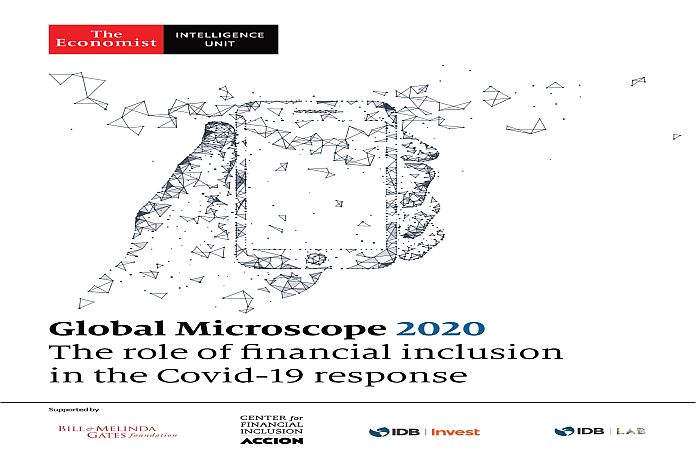WASHINGTON, USA – The countries whose financial sectors have invested in digital financial infrastructure were able to reach out faster to their most needed communities during the pandemic, according to the Global Microscope 2020 on financial inclusion performance.
This index, conducted every year by The Economist Intelligence Unit with support from IDB Lab, IDB Invest, the Center for Financial Inclusion (CFI), and the Bill & Melinda Gates Foundation, monitors how 55 emerging markets tackle financial inclusion through a number of variables such as regulation, infrastructure, consumer protection, and financial stability and integrity.
This year the study focused on the global COVID-19 crisis, and provides data on the role that financial inclusion has played in policymakers’ crisis response, to support vulnerable individuals, small businesses and the financial providers that serve poor households.
The economic consequences of border closures and lockdowns to mitigate the spread of the virus have had the greatest impact on the most vulnerable populations. Of the 55 countries analyzed in the Microscope, 44 implemented cash transfers to support vulnerable segments of the population. And despite big differences among countries, it has become clear that the digital infrastructure that includes high levels of access to identification, mobile phones and financial accounts, enabled governments to deliver COVID-19 emergency cash transfers efficiently and quickly. Of the countries with higher scores in digital infrastructure, 19 have implemented emergency cash transfers, and 14 of them are from Latin America and the Caribbean (LAC).
Peru and Colombia lead the Global Microscope 2020 ranking and are the only countries in the index to obtain the highest scores in all the five categories evaluated, followed closely by Uruguay, Mexico and Argentina, confirming for one more year, LAC’s leadership in financial inclusion. The report also shows that Brazil, Guatemala and Jamaica have achieved the fastest progress in the region thanks to their efforts to strengthen their digital financial services ecosystems.
The Microscope also reveals that 50 of the 55 analyzed countries have in place a national ID system that is at least partially digitised, helping facilitate access to financial services.
However, relying on digital channels risks excluding millions of women, who have lower levels of access to mobile phones and digital IDs and are among the most vulnerable segments of the population. The report highlights that while more than half of the countries included in the index have not formally implemented Know Your Customer (e-KYC) methods, 11 have relaxed due diligence requirements or allowed remote account opening during the pandemic, allowing 60 million new accounts globally to countries with pre-existing enabling environments and those that quickly adapted their rules.
According to the study, in order to contain systemic risks, several governments have provided support to large financial institutions. However, efforts to protect financial institutions that serve the poor (agents, MFIs, mobile money providers and others) have varied. The Microscope warns the collapse of microfinance and nonbank financial institutions represents a social risk, given that they serve over 140 million low-income customers worldwide.
Finally, the 2020 Microscope warns of an in increase in financial fraud during the pandemic that, together with concerns over data privacy, can put at risk the trust among new entrants to the financial system that are promoting the increased use of digital financial services. Only 22 of the 55 countries in this year’s index comprehensively protect individuals’ financial data, and only 18 have an entity with strong capacity to enforce data protection. For this reason, the Microscope is urging financial authorities to protect consumers from emerging risks, and to follow the example of the Dominican Republic, which has comprehensive legal framework to investigate and prosecute cybercrime.





